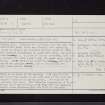Barlockhart Loch
Crannog (Period Unassigned)
Site Name Barlockhart Loch
Classification Crannog (Period Unassigned)
Alternative Name(s) Whitefield Loch; Dormans Island
Canmore ID 62196
Site Number NX25NW 7
NGR NX 2047 5631
Datum OSGB36 - NGR
Permalink http://canmore.org.uk/site/62196
- Council Dumfries And Galloway
- Parish Old Luce
- Former Region Dumfries And Galloway
- Former District Wigtown
- Former County Wigtownshire
NX25NW 7 2047 5631.
(NX 2047 5631) Lake Dwelling (NR) (Site of)
OS 6" map (1957)
Crannog (R W Feachem 1956). Evidence of a crannog, near the west end of Barlockhart Loch, which was formerly more extensive, was found by Wilson, who examined the site prior to 1874.
Two circular foundations of stone were noted, and also a stone causeway. A piece of oak was recovered, with one side dressed flat with a metal axe, the marks being quite distinct. There were found about the causeway, the upper stones of two granite querns, and on the crannog two roughly made spindle whorls. The querns and a grinding stone were donated to the NMAS.
G Wilson 1875; Proc Soc Antiq Scot 1885; RCAHMS 1912; R W Feachem 1956.
There is no trace of the crannog. Its site is firm ground about 100m square at the west edge of the loch and surrounded otherwise by marshy ground. No evidence of the causeway was seen. The 'circular foundations of stone' mentioned above may be those at NX 2044 5633 and probably represent stone clearance from the field to the west.
Visited by OS (EGC) 8 March 1968
Bun-shaped quern.
E J MacKie 1971
As the underwater component of Phase 2 of the South West Crannog Survey, the state of preservation of 14 crannog sites was evaluated in 12 lochs throughout Dumfries and Galloway as part of the Scottish Wetland Archaeology Programme (SWAP).
NX 2047 5631 Whitefield Loch; 'Dormans Island' (NX25NW 7). Visible above water as a tree island c 50m in diameter, this site extends c 10m outwards and c 2.5m down below water, and consists of large stones and boulders overlying layers of inorganic silt and grit. These layers in turn were seen to overlie organic deposits consisting of partially broken down plant material and dung, and contained hazel and birch twigs and occasional hazelnut shells. Woodchips were also noted. These deposits were visible in eroding sections located in at least three areas on the N and W sides of the site, exposing the deposits to a depth of c 50cm. Piles and large structural horizontal timbers were observed within and driven through these deposits, as well as in several areas outside the site. A causeway constructed of stones runs from the site to the SW shore. Evidence for degradation as a result of biological activity (aquatic plants and mollusca) was observed at various points on the site.
Sponsors: HS, Scottish Trust for Archaeological Research, AOC Archaeology Group, University of Nottingham
M G Cavers and J C Henderson 2002.
Barlockhart Loch (Luce catchment): location cited as NX 2047 5631.
This crannog is situated on the W edge of the loch, within land which is now drained, and is overgrown with willow carr, sedge and tall grasses. Examination by Wilson in the late 19th century revealed two circular stone foundations and a stone causeway; two querns and two spindle-whorls were found. The monument was relocated in 1989, when coring revealed wood, burnt bone, charcoal and plant matter below the surface.
The remains of this crannog were surveyed in July 2002 during the 2nd phase of the South-West Scotland Crannog Survey, with the intention of establishing an effective system of monitoring the rate of organic decay. This major threat was identified as the seasonally fluctuating water level. As an easily accessible example, and one of the few 'drained' crannogs which retain organic deposits, it was considered a worthwhile candidate for monitoring. The location and full extent should be confirmed by coring.
J C Henderson, B A Crone and M G Cavers 2003.
A third season of fieldwork and survey (see DES 2003, 42-3) on selected crannog sites in Dumfries and Galloway was carried out in July 2004 as part of the Scottish Wetland Archaeology Programme (SWAP). This comprised the underwater examination of six crannog sites selected for monitoring, the installation and surveying of monitoring probes at those sites, and the sampling of timbers from Loch Heron for radiocarbon dating.
NX 1206 6047 Cults Loch (Inch parish), NX16SW 14.
NX 2717 6482 Loch Heron (Kirkcowan parish), NX26SE 2.
NX 9028 6898 Loch Arthur (New Abbey parish), NX96NW 1.
NX 2047 5631 Whitefield Loch (Old Luce parish), NX25NW 7.
NX 2595 5915 Barhapple Loch (Old Luce parish), NX25NE 2.
NX 2047 5631 Barlockhart (Old Luce parish), NX25NW 7.
NX 8388 7188 Milton Loch (Urr parish), NX87SW 4.
Sponsors: HS, Scottish Trust for Archaeological Research, University of Nottingham, AOC Archaeology Group, Underwater Archaeology Research Centre.
J Henderson and M G Cavers 2004.
Diver Inspection (July 2004 - July 2004)
A third season of fieldwork and survey (see DES 2003, 42-3) on selected crannog sites in Dumfries and Galloway was carried out in July 2004 as part of the Scottish Wetland Archaeology Programme (SWAP). This comprised the underwater examination of six crannog sites selected for monitoring, the installation and surveying of monitoring probes at those sites, and the sampling of timbers from Loch Heron for radiocarbon dating.
NX 1206 6047 Cults Loch (Inch parish), NX16SW 14.
NX 2717 6482 Loch Heron (Kirkcowan parish), NX26SE 2.
NX 9028 6898 Loch Arthur (New Abbey parish), NX96NW 1.
NX 2047 5631 Whitefield Loch (Old Luce parish), NX25NW 7.
NX 2595 5915 Barhapple Loch (Old Luce parish), NX25NE 2.
NX 2047 5631 Barlockhart (Old Luce parish), NX25NW 7.
NX 8388 7188 Milton Loch (Urr parish), NX87SW 4.
Sponsors: HS, Scottish Trust for Archaeological Research, University of Nottingham, AOC Archaeology Group, Underwater Archaeology Research Centre.
J Henderson and M G Cavers 2004.












